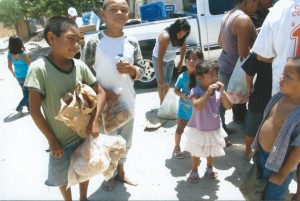by Nicholas Ballor, nSJ, November 10, 2013
Can we not give more?
The thought continues to haunt me as I think back on our recent visit. There is no excuse for allowing people, anywhere, to suffer such need.
We stuffed our little truck full of food and a few padded chairs early in the morning and drove out from Tijuana for about 45 minutes to arrive at a remote colonia.
Smoke, dust, garbage everywhere, random collections of wood and scrap stacked together to pass for shelters —
many side-by-side.
A scene of shades of brown dappled with black soot and white ash.  To the left on our way to our distribution site was a cube the size of a small house, with noxious black smoke and flames escaping from above. This brown chimney was the community’s primeval kiln used to make bricks, which served as a main source of income.
To the left on our way to our distribution site was a cube the size of a small house, with noxious black smoke and flames escaping from above. This brown chimney was the community’s primeval kiln used to make bricks, which served as a main source of income.
As we drove further along the rough, dusty road, we honked our horn periodically to signal our most recent arrival with food and supplies. Our distribution site was at a high point in the colonia. Some railroad tracks were to our side. We waited there in the pounding heat, hoping that word of our arrival had spread. They came in fits. Perhaps by clusters of families or close friendships — communication networks.
It felt almost an insult to give to these poor so little.
A pint of rice, a pint of beans, six pieces of fruit — a chair if you were among the lucky first arrivals. Imagine giving a small cup of cold water to a desert-stranded man. A welcome relief, but the thirst will return and the desert is vast. But we showed these few with what little we give that someone cares. They have a tangible sign of hope. They have love. They need so much more, but every river has its modest beginnings.
 The people did not strike me as suffering starvation, nor did they seem unhappy. Certainly, most were covered in dust, but most were fairly clean. No one struck me as mentally ill, and I was encouraged by how joyful many seemed. The children in particular seemed happy. So excited to get their banana or an orange, which we could only give them after ensuring their parents received their provisions. The children so present in the moment, not giving a thought to what may come.
The people did not strike me as suffering starvation, nor did they seem unhappy. Certainly, most were covered in dust, but most were fairly clean. No one struck me as mentally ill, and I was encouraged by how joyful many seemed. The children in particular seemed happy. So excited to get their banana or an orange, which we could only give them after ensuring their parents received their provisions. The children so present in the moment, not giving a thought to what may come.
An illness here and there was apparen t, but no dire problems. It is possible that those who came, or could come, were in the best of health and the rest, who we did not see, were left behind in the card-stack of scraps called “home.”
t, but no dire problems. It is possible that those who came, or could come, were in the best of health and the rest, who we did not see, were left behind in the card-stack of scraps called “home.”
I muse on what more might help these in such need. An education? Spiritual nourishment? A leader and a message? Food is much needed, but so much the more some means of earning food and of living together in harmony as a community and as part of a much larger community at large. Is this community a testament to the dire need for reform of the very societal and governmental system in place that has allowed or even necessitated that such a colonia exist?
They need an advocate. Yes, they suffer greatly without food, and it is badly needed, but they need all the more for the very root causes of their suffering and poverty to be addressed and healed. These causes lie within and manifest themselves everywhere as dysfunctional families, communities, governments.
These suffering are Christ among us today, continuing to cry out and making painfully apparent the consequences of sin.
To help the Casa de Los Pobres, please donate. Casa de Los Pobres USA has NO overhead, 100% of your donation goes to the Casa in Tijuana.




